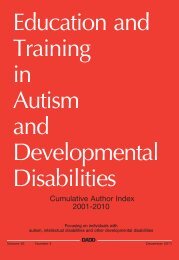etadd_47(3) - Division on Autism and Developmental Disabilities
etadd_47(3) - Division on Autism and Developmental Disabilities
etadd_47(3) - Division on Autism and Developmental Disabilities
Create successful ePaper yourself
Turn your PDF publications into a flip-book with our unique Google optimized e-Paper software.
cluded if (a) the sample included at least <strong>on</strong>e<br />
student with MID enrolled in school (i.e., a<br />
student between the ages of 3 <strong>and</strong> graduati<strong>on</strong><br />
or exiting school <strong>and</strong> was referred to as a<br />
student with MID by the authors of the study<br />
<strong>and</strong>/or the IQ reported in the study was between<br />
50 <strong>and</strong> 75); (b) the study focused <strong>on</strong> an<br />
academic mathematics interventi<strong>on</strong>, operati<strong>on</strong>ally<br />
defined as an interventi<strong>on</strong> targeting a<br />
skill area for advancement in school mathematics<br />
rather than daily living skills such purchasing<br />
groceries or counting m<strong>on</strong>ey; (c) the<br />
article was published in a peer-reviewed journal<br />
in English between 1999 <strong>and</strong> 2010; <strong>and</strong><br />
(d) the research occurred in the United<br />
States. Comm<strong>on</strong> reas<strong>on</strong>s articles were excluded<br />
included (a) the descripti<strong>on</strong> of the<br />
participants was unspecified; (b) the data for<br />
participants with MID were aggregated with<br />
data for other disabilities <strong>and</strong> could not be<br />
isolated; (c) the term MID (or something<br />
equivalent) was used by the authors, but all<br />
participants had IQs outside of the 50–75<br />
range; <strong>and</strong>/or (d) the studies were c<strong>on</strong>ducted<br />
in foreign countries where MID is defined<br />
differently (often with IQs up to 85) (e.g.,<br />
Kroesbergen & Van Luit, 2005). Articles focused<br />
<strong>on</strong> assessment (e.g., identificati<strong>on</strong> of<br />
students for special educati<strong>on</strong> services); descripti<strong>on</strong>s<br />
of characteristics of students with<br />
disabilities; <strong>and</strong> positi<strong>on</strong> papers were also excluded.<br />
Multiple methods were used to locate articles<br />
meeting the criteria. First, a keyword<br />
search was completed utilizing four electr<strong>on</strong>ic<br />
databases: PsychInfo, ERIC, Wils<strong>on</strong> Select,<br />
<strong>and</strong> ProQuest. Due to the number of terms<br />
used syn<strong>on</strong>ymously with MID, articles that<br />
used the terms mild mental retardati<strong>on</strong>, developmental<br />
disability, cognitive disability,<br />
mild intellectual disability, <strong>and</strong> mild cognitive<br />
impairment were included in the study (S<strong>and</strong>ies<strong>on</strong>,<br />
1998). For the keyword search, math*<br />
was combined with the following terms: mental<br />
impairment, mild cognitive, mild intellectual,<br />
mild mental retardati<strong>on</strong>, <strong>and</strong> mild developmental.<br />
The researchers also used the<br />
search terms, intellectual <strong>and</strong> cognitive<br />
disab*, <strong>and</strong> evaluated the IQ of the participants<br />
within these studies.<br />
Next, the researchers reviewed both general<br />
<strong>and</strong> special educati<strong>on</strong> journals for articles<br />
meeting the criteria published between the<br />
years 1999 <strong>and</strong> 2010. A h<strong>and</strong> search was completed<br />
by looking for relevant articles in the<br />
following journals: Journal for Research in Mathematics<br />
Educati<strong>on</strong>, Excepti<strong>on</strong>al Children, The Journal<br />
of Special Educati<strong>on</strong>, Remedial <strong>and</strong> Special<br />
Educati<strong>on</strong>, <strong>and</strong> Educati<strong>on</strong> <strong>and</strong> Training in <strong>Autism</strong><br />
<strong>and</strong> <strong>Developmental</strong> <strong>Disabilities</strong>. During the<br />
h<strong>and</strong> search, the researchers evaluated articles<br />
by looking for the search terms described<br />
above as well as any terms that might be relevant<br />
to this study (e.g., students with mild<br />
disabilities, math difficulties, etc.), but not<br />
specifically included in the search terms in the<br />
computer database search. Finally, the researchers<br />
completed an ancestral search using<br />
the references of the articles meeting criteria<br />
for inclusi<strong>on</strong> in this study. All of the articles<br />
were located in electr<strong>on</strong>ic databases using keyword<br />
searches except for <strong>on</strong>e article which was<br />
located by h<strong>and</strong>-searching the selected journals.<br />
The ancestral search did not result in<br />
finding any articles that met inclusi<strong>on</strong> criteria.<br />
Results<br />
Seven studies were found addressing academic<br />
mathematics interventi<strong>on</strong>s for students<br />
with MID published between the years 1999<br />
<strong>and</strong> 2010 (see Table 1). The participants<br />
ranged in ages from children in elementary<br />
school to a 23-year-old adult in an after high<br />
school program. The majority of the studies<br />
<strong>on</strong> mathematics instructi<strong>on</strong> <strong>and</strong> students with<br />
MID (i.e., six of seven) were focused <strong>on</strong> procedural<br />
instructi<strong>on</strong>; in other words, mathematics<br />
facts or computati<strong>on</strong> involving basic<br />
arithmetic (e.g., additi<strong>on</strong>, subtracti<strong>on</strong>, multiplicati<strong>on</strong>,<br />
<strong>and</strong> divisi<strong>on</strong> facts <strong>and</strong> traditi<strong>on</strong>al<br />
algorithmic procedures). The other study–<br />
focused <strong>on</strong> c<strong>on</strong>ceptual instructi<strong>on</strong>–involved<br />
an interventi<strong>on</strong> based <strong>on</strong> the use of mathematical<br />
models, prompts for cogniti<strong>on</strong>/metacogniti<strong>on</strong><br />
related to problem structure <strong>and</strong><br />
algebraic procedures for solving word problems.<br />
Procedural Instructi<strong>on</strong><br />
Flashcards. Flashcards were used in four of<br />
the six studies focused <strong>on</strong> procedural instructi<strong>on</strong>,<br />
each designed to improve the mathematical<br />
fact knowledge of students with MID (Dihoff,<br />
Brosvic, Epstein, & Cook, 2005; Hayter,<br />
392 / Educati<strong>on</strong> <strong>and</strong> Training in <strong>Autism</strong> <strong>and</strong> <strong>Developmental</strong> <strong>Disabilities</strong>-September 2012

















